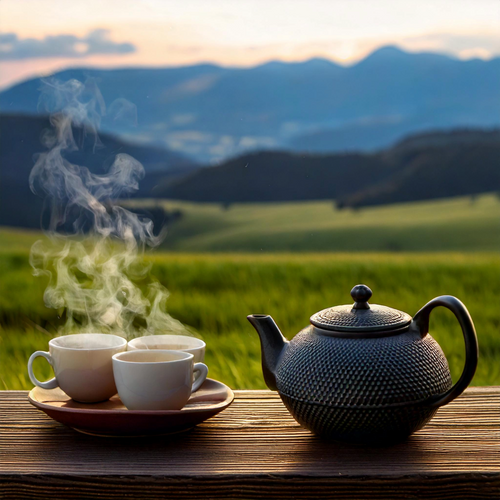
Benefits of Tea: An Ancient and Versatile Drink
Tea is one of the most popular beverages in the world, whether as a relaxing ritual on cold winter nights, as a refreshing drink on hot days or to accompany important moments in everyday life. In addition to being part of the culture of many countries, tea also offers a wide range of health benefits. Its history, which dates back thousands of years, and its positive impact on human well-being make it much more than just a drink.
The Millennial History of Tea
The benefits of tea have been recognized for over four thousand years, since 2737 BC, when the Chinese emperor Shen Nung consumed it for its medicinal properties. However, it was in the 8th century, during the Tang dynasty, that tea gained prominence with the treatise by Lu Yu, which detailed its characteristics and benefits. This treatise solidified China's role as the birthplace of tea's spread throughout the world.
Japan was the first country to adopt tea consumption outside of China, brought by Buddhist monks in the 9th century. The drink only arrived in Europe around 1559, brought by Portuguese navigators, although it was only in the 17th century that tea became popular, especially in England, where it was taken by the Portuguese princess Catherine of Braganza, who married King Charles II and spread the famous ritual of "five o'clock tea".
What is Tea?
Tea is a beverage made from leaves, flowers or herbs, often recognized for its medicinal properties. Some of the most common varieties include chamomile, mint, rosemary, hibiscus and fennel. These plants are rich in beneficial compounds, such as flavonoids, polyphenols and tannins, which provide a range of positive health effects.
The convenience of tea means it can be consumed for a variety of reasons: to relax, improve digestion, relieve cold and flu symptoms, and even aid in weight loss. However, it is important to remember that medicinal teas should only be consumed under medical supervision, as some plants may have side effects and contraindications.
Main Benefits of Tea
Teas have a wide range of benefits, ranging from relieving symptoms of illnesses to promoting overall well-being. Some of the main positive effects include:
- Relief from flu and cold symptoms: Mint, ginger and chamomile teas, for example, are great allies in relieving symptoms such as sore throat and nasal congestion, also helping with relaxation and expectoration.
- Weight Loss Support: Certain types of tea, such as green tea and hibiscus tea, are known to help speed up metabolism and fat burning, aiding in weight management.
- Cardiovascular Protection: Regular tea consumption can help reduce cholesterol levels and control blood pressure, important factors in preventing cardiovascular disease.
- Improved Sleep Quality: Teas such as chamomile and lemon balm have calming properties and are recommended for those who suffer from insomnia, anxiety or stress. They help promote deeper and more restful sleep.
- Antioxidant and Anti-inflammatory Action: Due to the presence of polyphenols and flavonoids, tea has a powerful antioxidant action, which helps fight free radicals, preventing premature aging and helping to reduce inflammation in the body.
- Digestion Support: Teas such as ginger and mint are excellent for relieving gastrointestinal discomforts, such as heartburn, reflux and constipation, in addition to promoting more efficient digestion.
- Hydration and General Well-being: In addition to containing beneficial substances, tea is an excellent source of hydration, contributing to the body's water balance and providing a feeling of comfort and relaxation.
Medicinal Properties of Plants Used in Tea
The herbs used to prepare tea are rich in compounds that have a positive effect on our bodies. Among the main properties we can highlight:
- Anti-inflammatories: Many herbs contain substances that reduce inflammation, making them beneficial for those suffering from conditions such as rheumatoid arthritis and gout.
- Antioxidants: The antioxidants in tea help neutralize free radicals, which can cause cellular damage and accelerate aging.
- Expectorants and Calming Agents: Some plants, such as eucalyptus and chamomile, have the ability to relax the respiratory muscles, helping to relieve vomiting and other cold symptoms.
- Diuretics: Teas such as horsetail and hibiscus help eliminate excess fluids in the body, promoting kidney health and preventing outbreaks.
- Stimulants: Teas such as green and black tea contain caffeine, which can improve alertness and mental performance, as well as boost metabolism.
Therefore....
Tea is a versatile drink that, in addition to being a delight for the palate, offers considerable health benefits. Whether it is to promote digestion, improve sleep or simply relax, tea is part of an ancient tradition that continues to be enjoyed and recommended to this day. However, to get the most out of its properties, it is important to consume it in a balanced way and always consult a specialist before using teas for therapeutic purposes.
Sources:
- LARI, ZN; et al. Efficacy of inhaled Lavandula angustifolia Mill. Essential oil on sleep quality, quality of life and metabolic control in patients with type II diabetes mellitus and insomnia . J Ethnopharmacol. 251. 112560, 2020
- ZHANG, W.; et al. Tea polyphenols-loaded nanocarriers: preparation technology and biological function . Biotechnol Lett. 44. 3; 387-398, 2022
- KHAN, N.; MUKHTAR, H. Tea and Health: Studies in Humans . Curr Pharm Des. 19. 34; 6141–6147, 2013
- MCKAY, D.L.; BLUMBERG, JB A review of the bioactivity and potential health benefits of chamomile tea (Matricaria recutita L.) . Phytother Res. 20. 7; 519-30, 2006
- ALI, BH; et al. Some phytochemical, pharmacological and toxicological properties of ginger (Zingiber officinale Roscoe): A review of recent research . Food and Chemical Toxicology. 46. 409–420, 2008



